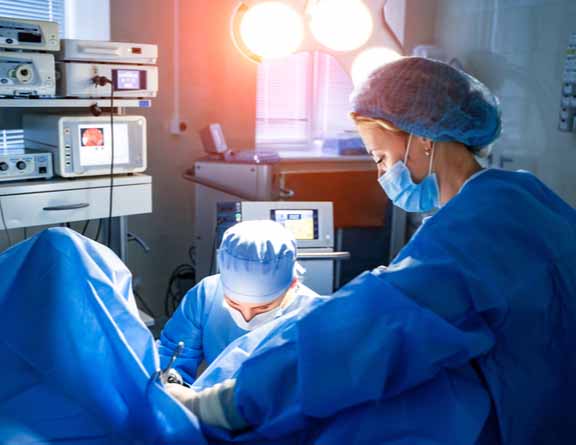
Haldia
USFDA-Approved Procedure
Support in Insurance Claim
No-Cost EMI
1-day Hospitalization
Piles are also called hemorrhoids. It is one of the anorectal diseases where an individual can suffer from severe anal pain while passing stools, walking, sitting, and running. These symptoms are the result of inflamed and swollen tissue, muscles, and blood vessels in or outside of the anus. This needs to be treated in time to avoid further complications which can impact one's daily routine.
Piles treatment includes medications, lifestyle changes, dietary modifications, and surgical interventions. In most cases, surgical procedures like laser piles surgery, open piles surgery, sclerotherapy, cauterization, and rubber band ligation are recommended by many anorectal surgeons to treat piles.
Out of these, laser piles operation is considered the best and safest surgical procedure to treat piles. This method doesn’t include large incisions, excessive bleeding, risk of infection, and post-surgical complications.
To undergo the safest and cost-effective piles treatment in Haldia, visit us.

This is how the doctor examines the patient for piles:

At Pristyn Care, severe cases of piles are treated with laser procedure. The method comes into consideration when there is no progress with home remedies to treat piles.
Laser surgery is considered to be the most advanced and effective treatment for piles. During this procedure, a laser beam is used to burn and shrink the hemorrhoids. The surgeon focuses a narrow beam of light on the anal tissues. The procedure is less invasive, causes minimal to no bleeding, and very minimal pain.
Delivering Seamless Surgical Experience in India
At Pristyn Care, you can avail advanced piles treatment surgery using a laser for better results and quicker recovery without any postoperative complications.
Pristyn Care promises quick recovery from piles pain with advanced treatment option. Most patients experience effective relief from anal pain and discomfort within a couple of days of treatment.
At Pristyn Care, we have expert proctologists with 8-10 years of experience in performing advanced piles treatment surgery with successful results.
Pristyn Care provides end-to-end process handling for all patients. From the beginning of the piles treatment to treatment conclusion, a care coordinator will remain in touch with you.
Finding the best piles hospitals in Haldia can be a hectic task because of the availability of several medical providers. But most people choose us to get treated for piles as we provide several medical facilities and services at an affordable cost.
We are associated with many hospitals where you can avail the safest piles treatment at an affordable cost. All our partnered hospitals are highly equipped with advanced medical tools and surgical instruments. To keep our patients safe from COVID and other contagious diseases, we follow all the patient safety protocols suggested by the World health organization [WHO].
If you wish to consult an expert piles doctor and undergo the safest piles surgery, you can visit our partnered hospitals.
With the following medical facilities and services, we help our patients to undergo the seamless and safest piles surgery in Haldia.
To know more about the medical services and facilities, we provide at Pristyn Care, you can call us or fill in the form that is on this page.
Different types of treatment methods are used on various piles based on their severity and grade. Here you can know what those are.
Here are some of the safety tips that one should follow after piles surgery. These tips can help the patient to recover quickly and heal faster.
These tips can help reduce the chances of post-surgical complications and boost the healing process.
If you wish to undergo the minimally invasive piles surgery, you can book an appointment with our doctors, which is easy to do.
You can call the phone number or fill in the form that is on this page. One of our medical coordinators will call back to know the basic details of the patient. Then, our medical coordinator will book an appointment with the nearest piles doctor at your convenience.
You can have an online consultation with our piles doctors in Haldia, and to have one, go through our official website or the Pristyn Care mobile application.
The cost of open piles surgery in Haldia ranges between Rs. 35,000 and Rs. 85,000. This price range varies from one person to another due to various factors like the type of hospital, the doctor fee, type of piles, and the cost of medications.
Medically there is no way to cure piles permanently. But if you follow self-care tips recommended by the doctor you can reduce your chance of developing piles and their recurrence.
The cost of laser piles surgery in Haldia ranges anywhere between Rs. 45,000 and Rs. 1,10,000. This is not the exact price and keeps changing based on several factors.
Medical specialists like proctologists, anorectal surgeons, colorectal surgeons, and general surgeons can diagnose, treat, and cure your piles. You can visit our partnered hospitals to undergo the safest laser piles surgery in Haldia.
Different methods of piles treatment are medications, lifestyle changes, dietary changes, laser surgery, open or traditional surgery, rubber band ligation, cauterization, hemorrhoid stapling, hemorrhoidectomy, sclerotherapy, Injection, coagulation, etc. To know more, you can consult our expert piles doctors in Haldia.
.svg)
.svg)
.svg)